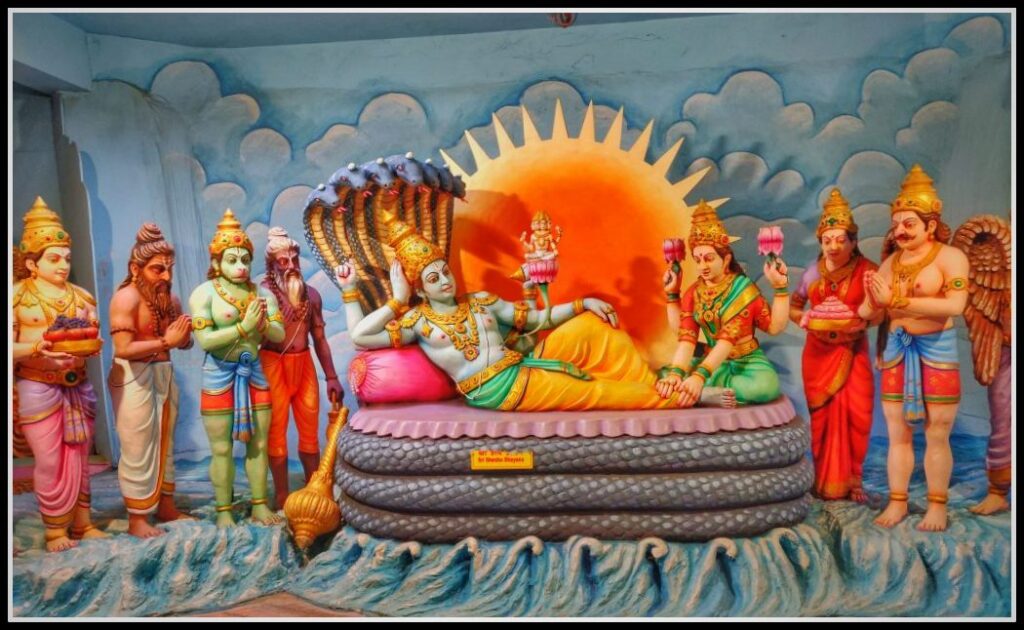
Krishna is also referred to as ‘Bhagavan Swayam’ in Srimad Bhagavatam, thereby implying that He is the source of all avatars (incarnations) of Godhead. Krishna is ‘Svayam rupa’ or the original supreme personality of Godhead, and is also referred to as ‘puskala’ or the most complete. When various forms of the Supreme Lord (Krishna) manifest their appearance in this material world for various purposes, they are known as ‘avatars’. We have previously discussed the various forms of the Supreme Lord (Svayam rupa, tad ekatma rupa, avesha) and they are known as avatars when they descend from the spiritual to the material world. These various forms of the Supreme Lord are eternally existing in their own spiritual abodes. Vishnu avatars can appear through parents, as expansions, or without the help of any agency.
For example, Lord Krishna and Ramachandra appeared as the sons of Vasudeva and Dasaratha respectively. Garbhodakasayi Vishnu originates as an expansion of Maha-Vishnu. While among those Vishnu avatars who appear without help are Matsya and Hamsa avatars.
There are six types of avatars of the Supreme Lord namely –
- Purusha avatar
- Guna avatar
- Lila avatar
- Manvantara avatar
- Yuga avatar
- Shaktyavesha avatar
We shall discuss briefly about each of them in this article.
#1 Purusha avatar
The Satvata tantra (1.30) states the following – Vishnu has three forms called Purusha. The first of them is ‘Maha-Vishnu’ who creates the total material energy (mahat), the second is Garbhodakasayi Vishnu, who is situated within each universe. The third is Ksirodakasayi Vishnu, who lives in the heart of every living being. One who knows these three becomes liberated from the clutches of Maya (illusion).
#1.1 Maha Vishnu (Karanodakasayi Vishnu)
Maha Vishnu is the Purusha avatar who originates from Narayana, the Lord of Vaikuntha. Maha Vishnu is the source of the vast expanse of spiritual water known as the Causal ocean (Karana sagar). He glances at material nature (Prakriti), thus impregnating her with the seeds of the material universes and the spiritual sparks who populate those universes.
#1.2 Garbhodakasayi Vishnu
Garbhodakasayi Vishnu lies within the water of each universe and from His navel sprouts a lotus stem on whose atop sits Brahma, the chief engineer of the universe. The stem of this lotus is the resting place of the multitude of planets. When Garbhodakasayi Vishnu first enters a universe, he finds it dark and empty, with no place to reside.
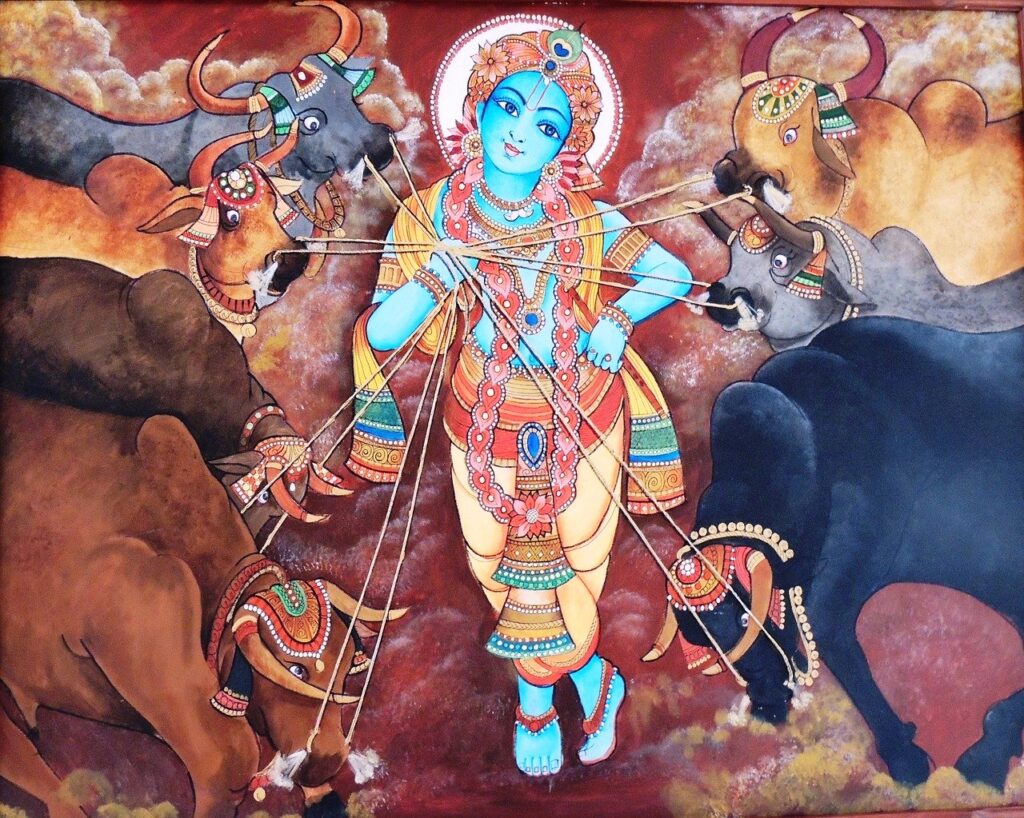
He first creates the universal water from the perspiration of His body, which fills half of the universe. He makes His own residence in these waters and thereafter manifests the planetary systems, in the other half of the universe. Within these universal waters, He manifests Vaikuntha, His own abode, and rests on it upon the bed of Ananta Sesha.
#1.3 Ksirodakasayi Vishnu
Ksirodakasayi Vishnu, the Lord of the ocean of milk, manifests within the heart of every living being in a suitable size. In the case of human beings, His size is that of one pradesa (distance between the tips of a person’s extended thumb and index finger). Ksirodakasayi Visnu is commonly referred to as the Supersoul. Within the ocean of milk, there exists the island of Svetadvipa which is the abode of Ksirodakasayi Vishnu. Ksirodakasayi Vishnu descends to preserve the material world and vanquish principles of irreligion, millennium after millennium. Ksirodakasayi Vishnu is counted both among Purusha and Guna avatars of the Supreme Lord.
#2 Guna avatar
Guna avatars are incarnations that appear from the Purusha avatars. For example, Vishnu, Brahma, and Rudra fall within the category of Guna avatars. Vishnu appears for the purpose of maintenance, Brahma appears for creation and Rudra appears for destruction. The Supreme Lord is transcendental to the material world but indirectly associates with the modes of material nature namely passion, goodness, and ignorance for creation, maintenance, and destruction of this material world. Vishnu is the form of the quality of goodness, Brahma is the form of the quality of passion and Rudra is the form that associates with the mode of ignorance. Contact with the mode of goodness is spiritually more beneficial than the modes of passion and ignorance. Hence all living entities can derive utmost benefit from worshiping Vishnu, the form of the quality of goodness.
#3 Lila Avatars
The following are the list of Lila avatars as mentioned in Srimad Bhagavatam –
#Kumaras – These 4 Kumaras appeared from Brahma as golden complexioned five-year old boys who had descended to preach pure knowledge and devotional service.
#Narada – Sage of the demigods who instructs on pure devotional service and inspires non-fruitive actions. Narada possesses a radiant moonlike complexion.
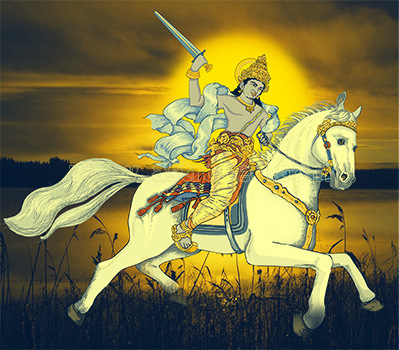
# Varaha – Boar incarnation of the Supreme Lord who lifted earth from the nether regions of the universe, after killing the demon Hiranyaksha with His tusks. Hiranyaksha was responsible for drowning the earth in the great ocean of the universe. Varaha avatar appears twice in a day of Brahma. He first appears during the reign of Svayambhuva Manu where He lifts the earth from the lower regions of the universe. He appears again during Chaksusa Manu and this time while lifting the earth, He also kills the demon Hiranyaksha.
# Matsya – The fish incarnation of the Supreme Lord who towed the boat carrying seeds of every form of life and secured it to a peak in the Himalayan range. In this way, the Lord ensured the continuity of life in this world, saving it from the waters of universal annihilation. Like Varaha deva, the Mastya avatar also appears twice in a day of Brahma. In His first incarnation, he kills the demon Hayagriva (who steals the Vedas from Brahma) and rescues the Vedas. In His second avatar, He protects life on this world from the universal waters.
#Yajna – son of Prajapati Ruci and Akuti. He ruled during the reign of Svayambhuva manu, and relieved the three worlds from great distress.
#Nara-Narayana – Nara and Narayana were twins who were born from the womb of Murti (wife of Dharma and the daughter of Daksha). Nara-Narayana undertook exemplary penances to control the senses. Even Cupid was unsuccessful in breaking their vows.
#Kapila – Son of Kardama muni and Devahuti. Lord Kapila taught how to distinguish the elements of creation that evolve from Prakriti, about her controller, the Purusha. He spoke the science of Sankhya to demigods headed by Brahma.
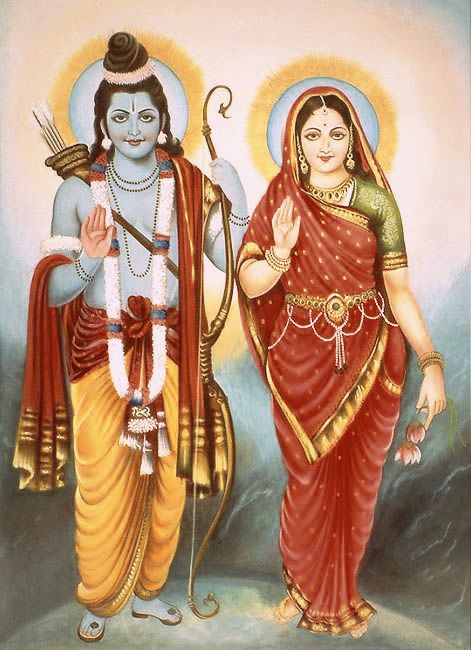
#Dattatreya – The Supreme Lord incarnated as Dattareya, the son of Atri and Anusuya. He spoke transcendental science to Alarka, Prahlada and others.
#Hayasirsa – He manifested from the sacrificial fire and is Vedas personified. He killed the demons Madhu and Kaitabha and rescued the Vedas.
#Hamsa – Hamsa avatar appeared from water as a regal swan. He instructed the science of devotional service to Brahma, Narada and Kumaras.
#Dhruvapriya or Prsnigarbha – Dhruva, the son of King Uttanapada, left home in search of the Supreme Lord, being unable to tolerate how his stepmother insulted him. Being guided by Narada, Dhruva performed severe austerities and finally attained the mercy of Lord Vishnu. Dhruva was awarded with Dhruvaloka, the highest planet of the universe. Lord Prsnigarbha was the avatar who had blessed Dhruva Maharaj.
#Rsabha – Incarnating as Rsabha, the son of King Nabhi and Marudevi, the Lord taught the religious principles of the paramhamsas. He performed jada-yoga to equibalance the mind. This is accepted as the highest perfectional situation of liberation.
#Prthu – When sages churned King Vena’s dead body, the great king Prthu, with a complexion as effulgent as pure gold, appeared from Vena’s right arm. King Prthu delivered King Vena from hell. Prthu milked the earth, drawing out all kinds of crops as produce.
#Narasimha – Lord Narasimhadeva appeared from a pillar to protect His devotee Prahlada and vanquish the demon Hiranyakashipu, Prahlada’s father, who was trying to kill his own son. Lord Narasimha deva appeared in the sixth Manvantara, which happened before the churning of the milk ocean. This avatar has many vilasa expansions like Lakshmi Narasimha, Ugra Narasimha and others, each possessing different bodily complexions and activities.
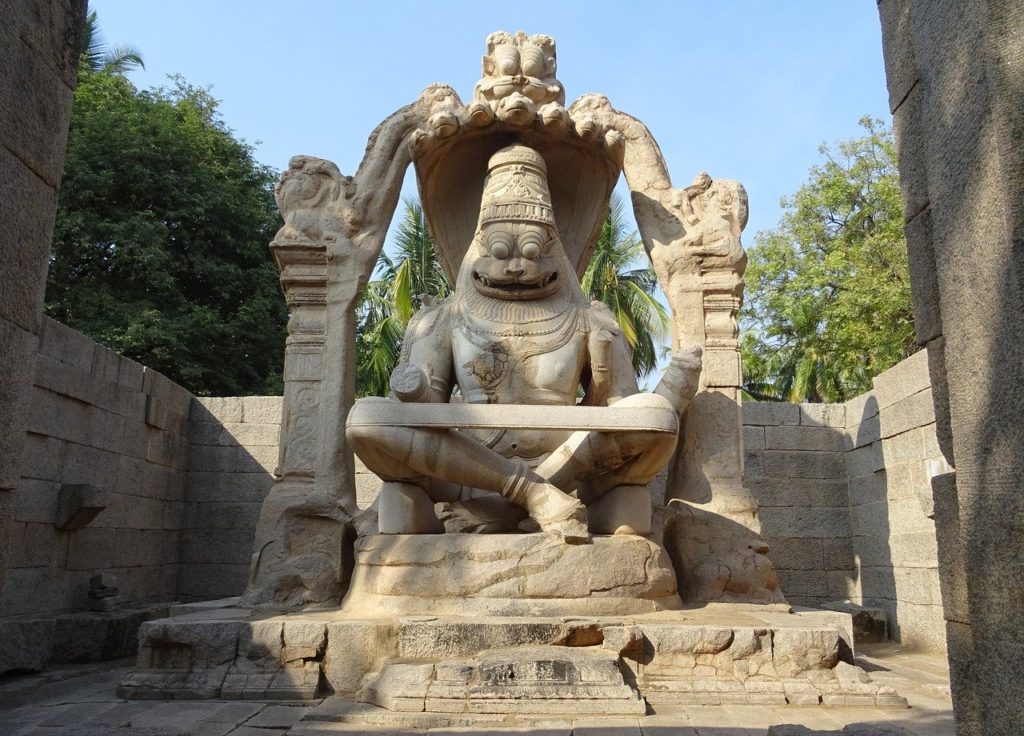
#Kurma – The tortoise incarnation of the Supreme Lord, whose shell served as a pivot for the Mandara hill, that was used as a churning rod by the demigods (devas) and the demons (asuras) during samudra manthan (churning of the milk ocean). Kurma avatar also perpetually holds up the earth and maintains it in its position in the universe.
#Dhanvantari – Lord Dhanvantari, the first teacher of medical science, appeared in order to deliver nectar, the reason why the demigods and demons churned the milk ocean. He initiated the teaching of Ayur-veda.
#Mohini – Mohini Murti is the beautiful female form of the Supreme Lord who bewildered the demons, tricked them and denied them Amrita (immortal nectar). There is also a pastime where Mohini murti bewilders even Lord Shiva.
#Vamana – The dwarf Brahmana incarnation of the Lord who tricked Bali maharaj by asking for three steps of land, and thereby denying him of all his material possessions. The King ultimately dedicated his own body to fulfill the measurement of the Lord’s third step. Vamana deva was won over by Bali Maharaj and hence the Lord served as the King’s doorkeeper.
#Bhargava Parasurama – The Supreme Lord appeared as the brahmana named Parasurama, who was the son of Renuka and Jamadagni. He was a descendant of Bhrigu muni. He vanquished all the Kings, encircling the world twenty one times. He was angry with them as they had deviated from religious principles.
#Ramachandra – Lord Rama appeared in Treta Yuga. He was the son of Dasaratha and Kausalya. He killed the demon Ravana.
#Vyasa – Vyasa deva was the son of Satyavati and Parasara muni. He divided the one Veda into several branches and sub-branches, seeing that people of Kali were less intelligent. He is the author of the epic Mahabharata.
#Balarama – Balarama is the brother of Lord Krishna. He is the first expansion of the Supreme Lord. Lord Balarama first entered the womb of Devaki and was then conveyed to the womb of Rohini. Thus He literally has two mothers. Balarama expands as Sankarsana who also manifests Himself as the holder of the earth and also the bed of Lord Vishnu.
#Krishna – Son of Nanda Maharaj and Yashoda, is the source of all the incarnations of the Supreme. He is the original Supreme Personality of Godhead (Isvara paramah Krishna) and the Supreme cause of all causes (sarva karana karanam).
#Buddha – Son of Anjana, Buddha deludes the atheists, by speaking on sub-religious principles.
#Kalki – Kalki avatar appears at the conjunction of Kali and Satya yugas. By this time, the rulers of earth degenerate into plunderers. Kalki avatar makes His appearance to annihilate the miscreants and re-establish the postulates of eternal religion. He appears as the son of Vishnuyasha, an eminent brahmana of a village named Shambhala.
#4 Manvantara avatar
Manvantara avatars are those incarnations of the Supreme Lord who appear among the demigods, primarily to help Indra, the king of heaven, by killing his adversaries. The Lord descends into each of the Manu dynasties, to rule over the evil kings, subduing them with His powerful wheel weapon. Some lila avatars like ‘Yajna’ are also counted among manvantara avatars because they provide special protection during the reign of a particular Manu. Each of Brahma’s day, that comprises 1000 cycles of four yugas, is divided into fourteen Manvantaras, and each of these is ruled by a particular Manu (father of mankind). The Manvantaras are listed below –
- Yajna – son of Prajapati Ruci and Akuti. He ruled during the reign of Svayambhuva manu, and relieved the three worlds from great distress.
- Vibhu – son of Vedasira and Tushita. Vibhu remained a brahmachari (celibate) and preached self control, austerity and other religious principles.
- Satyasena – son of Sunrta and Dharma (demigod of religion). Along with his friend Satyajit, Satyasena killed impious Yakshas, Rakshasas, ghosts, etc who tormented other living beings.
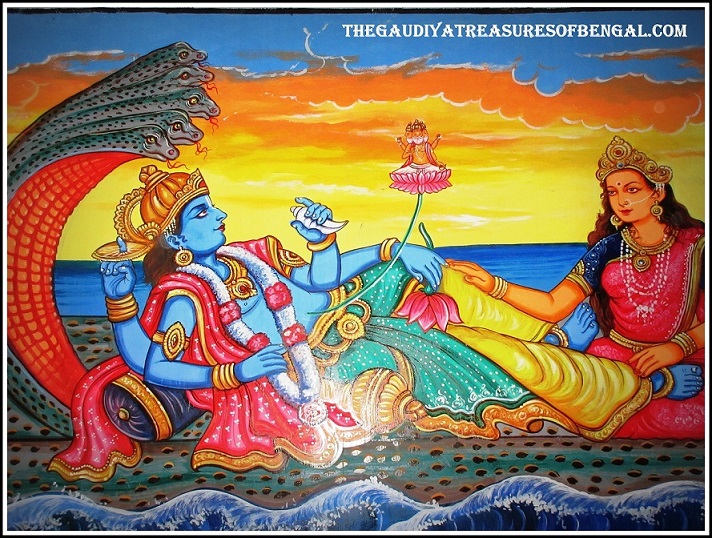
- Hari – Son of Harini and Harimedha. Hari saved the devotee Gajendra, the king of elephants, when it was locked in a fierce fight with a crocodile.
- Vaikuntha – son of Subhra and Vikuntha. In order to please the goddess of fortune, Vaikuntha created another Vaikuntha planet (spiritual planet) that is worshiped by everyone. This planet is a manifestation of the infallible supreme world of Vaikuntha.
- Ajita – Son of Vairaja and Sambhuti. By churning the ocean of milk, Ajita produced nectar for the demigods. As a tortoise, he carried the great Mandara mountain on His back.
- Sarvabhauma – Son of Devaguhya and Saraswati. He will take the kingdom away from Indra and give it to Bali Maharaj during his reign.
- Rsabha – Son of Ayushman and Ambudhara. He will enable Indra, named Adbhuta, to enjoy the opulence of the three worlds.
- Visvaksena – Son of Visvajit and Visuci. He will make friends with Sambhu.
- Dharmasetu – Son of Aryaka and Vaidhrta. He will rule the three worlds.
- Sudhama – Son of Sunrta and Satyasaha. He will rule the twelfth manvantara.
- Yogesvara – Son of Brhati and Devahotra. He will perform activities for the welfare of Indra, named Divaspati.
- Brhadbhanu – Son of Vitana and Satrayana. He will promote spiritual activities.
#5 Yuga avatars
In each of the yugas (millenniums) – Satya, Treta, Dvapara, and Kali, the Supreme Lord incarnates, and in each incarnation, He possesses a different color as per the yuga. In Satya-yuga the color of the principal incarnation is white. In the Treta-yuga His color is red; in the Dvapara-yuga His color is blackish (Krsna), and in the Kali-yuga the color of the principal incarnation is yellow (Caitanya Mahaprabhu). This is confirmed in Srimad-Bhagavatam (10.8.13) by the astrologer Gargamuni, who calculated Krishna’s horoscope in the house of Nanda Maharaja.
In the Satya yuga a white avatara appeared to Kardama muni to establish meditation as the process for self-realization.

In the Treta yuga a red avatara appeared to Brahma to establish fire sacrifice as the process for self-realization.
In the Dvapara yuga a dark avatara (Krishna) appeared as the son of Devaki to establish temple worship as the process for self-realization.
In the Kali yuga a Yellow avatara appeared (Chaitanya Mahaprabhu) as the son of Saci Mata to establish the chanting of Lord Hari’s holy names (Hari nama sankirtana) as the process for self-realization.
#6 Shaktyavesha avatar
Exalted living entities whom the Supreme Lord empowers with a portion of His knowledge, strength, etc are known as Aveshas. We find Avesha forms of the Lord like Narada and Sanaka even in Vaikuntha (spiritual world). The four Kumaras, Maharaja Prithu, Parashurama, Lord Brahma, etc are all examples of ‘Aveshas’ of the Supreme Lord. The power of knowledge was invested in the four Kumaras, the power of devotional service was invested in Narada, the power of creation was invested in Lord Brahma and the power to bear innumerable planets was invested in Lord Ananta.
There are unlimited Shaktyavesha incarnations of the Supreme Lord. But some have been cited in the Vedic literature as examples. These are of two types – direct and indirect. When the Supreme Lord Himself expands displaying a particular power of His opulence, it is known as ‘Sakshat’ (direct). However, when He empowers a living entity with His prowess or potency, for some specific purpose, that living entity is referred to as indirect or avesha incarnation.